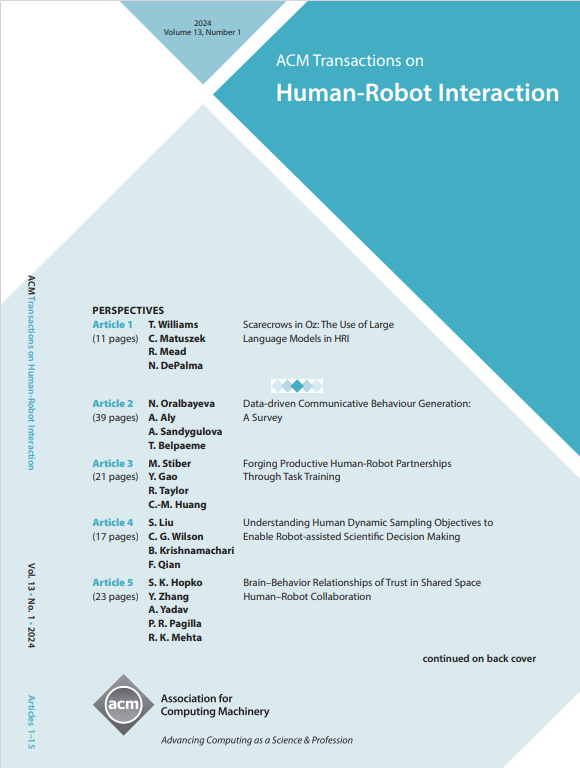基于透明矩阵叠加的人机协作交互式策略制定
IF 5.5
Q2 ROBOTICS
引用次数: 4
摘要
有效的人机协作的一个重要方面是机器人快速适应人类需求的能力。虽然像深度强化学习这样的技术已经证明了作为学习机器人策略的复杂工具的成功,但人机协作的流畅性往往受到这些策略无法整合用户对任务偏好变化的限制。为了解决这些缺点,我们提出了一种新的方法,可以在执行时通过象征性的if-this-then-that规则来修改学习到的策略,这些规则对应于机器人策略上的一组模块化和可叠加的低级约束。这些规则,我们称之为透明矩阵叠加,不仅作为机器人当前策略的简洁和可解释的描述,而且作为一个接口,人类合作者可以通过口头命令轻松改变机器人的策略。我们在模拟和物理机器人上执行的一系列概念验证烹饪任务中证明了这种方法的有效性。本文章由计算机程序翻译,如有差异,请以英文原文为准。
Interactive Policy Shaping for Human-Robot Collaboration with Transparent Matrix Overlays
One important aspect of effective human--robot collaborations is the ability for robots to adapt quickly to the needs of humans. While techniques like deep reinforcement learning have demonstrated success as sophisticated tools for learning robot policies, the fluency of human-robot collaborations is often limited by these policies' inability to integrate changes to a user's preferences for the task. To address these shortcomings, we propose a novel approach that can modify learned policies at execution time via symbolic if-this-then-that rules corresponding to a modular and superimposable set of low-level constraints on the robot's policy. These rules, which we call Transparent Matrix Overlays, function not only as succinct and explainable descriptions of the robot's current strategy but also as an interface by which a human collaborator can easily alter a robot's policy via verbal commands. We demonstrate the efficacy of this approach on a series of proof-of-concept cooking tasks performed in simulation and on a physical robot.
求助全文
通过发布文献求助,成功后即可免费获取论文全文。
去求助
来源期刊

ACM Transactions on Human-Robot Interaction
Computer Science-Artificial Intelligence
CiteScore
7.70
自引率
5.90%
发文量
65
期刊介绍:
ACM Transactions on Human-Robot Interaction (THRI) is a prestigious Gold Open Access journal that aspires to lead the field of human-robot interaction as a top-tier, peer-reviewed, interdisciplinary publication. The journal prioritizes articles that significantly contribute to the current state of the art, enhance overall knowledge, have a broad appeal, and are accessible to a diverse audience. Submissions are expected to meet a high scholarly standard, and authors are encouraged to ensure their research is well-presented, advancing the understanding of human-robot interaction, adding cutting-edge or general insights to the field, or challenging current perspectives in this research domain.
THRI warmly invites well-crafted paper submissions from a variety of disciplines, encompassing robotics, computer science, engineering, design, and the behavioral and social sciences. The scholarly articles published in THRI may cover a range of topics such as the nature of human interactions with robots and robotic technologies, methods to enhance or enable novel forms of interaction, and the societal or organizational impacts of these interactions. The editorial team is also keen on receiving proposals for special issues that focus on specific technical challenges or that apply human-robot interaction research to further areas like social computing, consumer behavior, health, and education.
 求助内容:
求助内容: 应助结果提醒方式:
应助结果提醒方式:


